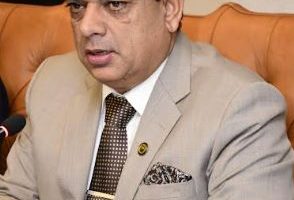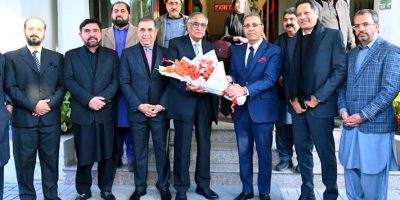Pakistan, Kazakhstan sign deal to promote research

ISLAMABAD , DEC 02 : Pakistan and Kazakhstan signed a memorandum of understanding (MoU) on Thursday to kick-start an era of research and academics in various fields of commonalities, a statement said.
The agreement was signed between the Islamabad Policy Research Institute and the Foreign Policy Research Institute of the Ministry of Foreign Affairs of Kazakhstan at a roundtable, organised to celebrate the three decades of congenial and cooperative relations between the two countries.
This agreement will bring together five think tanks in both the countries.
The roundtable spread over five sessions was graced by Kazakhstan’s Ambassador to Pakistan Yerzhan Kistafin and Pakistan’s Ambassador to Kazakhstan Sajjad Ahmed Seehar.
The Kazakh envoy said his country looks forward to deepening of relations in the years to come, while the format of geoeconomics has further improved the bilateral relations.
He was referring to a cobweb of regional integration and connectivity under way under the banner of Belt and Road Initiative.
The Kazakh envoy underscored the need for peace and stability in Afghanistan, and termed it a must to realise a new era in commerce and communications.
Ambassador Kistafin termed the MoU a step in the right direction and complemented the IPRI for taking the initiative. While Kazakhstan is one of the biggest landlocked states in the world, it understands the indispensability of transit and regional amalgamation, he added.
The issues of nuclear security, proliferation, trade protocols, climate change and the necessity of furthering people-to-people contacts were highlighted in the sessions.
The need was stressed for introducing direct flights between the two countries to promote interaction between the businessmen and academicians.
Relaxation in the visa regime and enabling more interaction between the commerce circles of the two countries was also highlighted, so that Pakistan could benefit from the economic wonders that the young central Asian state has achieved.
IPRI acting president Brig Raashid Wali Janjua (Retd) brought to fore his personal experiences with the Central Asian State, as an army officer in yesteryears, and eulogised the aspect of foreign policy evolution in the breakaway republic of former Soviet Union.
Janjua said the initiative to form a conclave of think tanks is a leap forward and will cement relations in research and socioeconomic development.
He highlighted the magnitude of defence cooperation that is evolving between the two countries in the backdrop of Army Chief General Qamar Javed Bajwa’s visit to Astana.
The sessions were also addressed by Timur Shaimergony, deputy director the library of the First President of the Republic of Kazakhstan, Elbasy; Dr Talat Shabbir, director of China-Pakistan Study Centre, Institute of Strategic Studies Islamabad (ISSI); Ambassador Bolat Nurgaliyev, chairman of the Board, Foreign Policy Research Institute under the Ministry of Foreign Affairs of Kazakhstan; Dr Murat Laumulin, chief research fellow of Kazakhstan Institute of Strategic Studies under the President of the Republic of Kazakhstan; Lt Col Khalid Taimur Akram (Retd), executive director of the Center for Global and Strategic Studies (CGSS); Beysengazin Kuanysh, director of the Center for Macroeconomic Research and Forecasting, Kazakhstan Economic Research Institute; Raja Rafuillah, research fellow of the Pakistan Institute of Development Economics (PIDE); Yerzhan Saltybayev, director of the Institute of World Economics and Politics (IWEP) and Dr Tanweer Khalid, honorary secretary of Pakistan Institute of International Affairs (PIIA).
Former ambassador Asif Durrani, senior research fellow of IPRI was also present on the occasion.
Related News

ICCI urges real estate designation as industry
ISLAMABAD, JAN 25 /DNA/ – President of the Islamabad Chamber of Commerce and Industry (ICCI),Read More

FTO vows to protect taxpayers’ rights, expedite complaints in RCCI visit
ISLAMABAD, JAN 23 /DNA/ – Federal Tax Ombudsman (FTO) Mr. Zafar-ul-Haq Hijazi paid an officialRead More


Comments are Closed